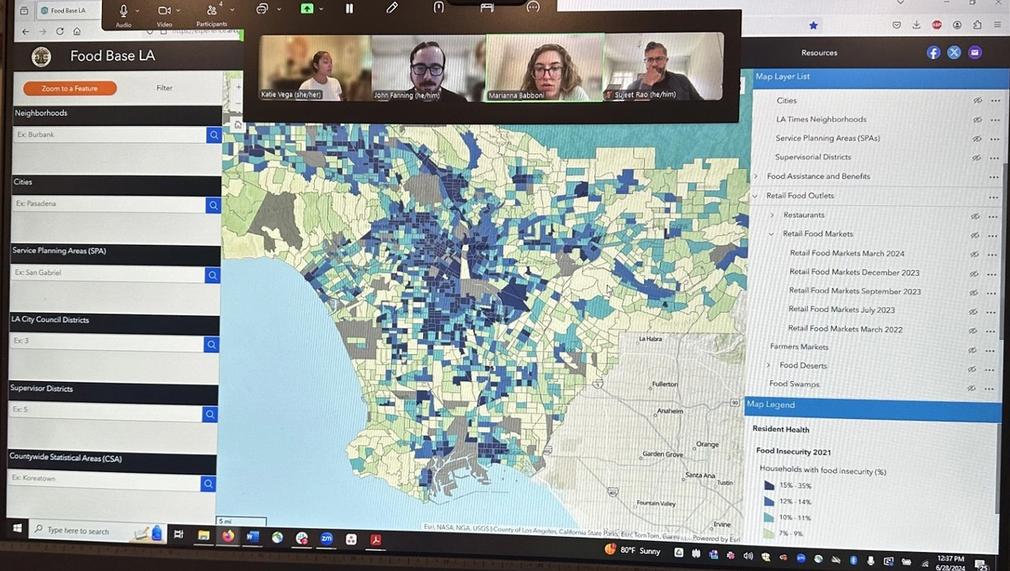LA County Food System Dashboard
As of July 2023, USC's food security team found that over 1M LA County (LAC) households were food insecure. USC Dornsife's Public Exchange, Spatial Sciences Institute, and Institute for Food System Equity are building a data dashboard of the LAC food system to support stakeholders implementing LAC's Food Equity Roundtable Action Plan to address this crisis. Food and nutrition security for all residents is the goal, and the USC team will provide critical data and analytics to ensure effective implementation and impact for those most in need.

What is the primary issue area that your application will impact?
Food insecurity and access to basic needs
In what stage of innovation is this project, program, or initiative?
Expand existing project, program, or initiative (expanding and continuing ongoing, successful work)
What is your understanding of the issue that you are seeking to address?
Food insecurity—lacking access to enough food to live an active, healthy life because of limited resources—is a crisis in LA County (LAC) that the USC team has been tracking since 2020. Currently, 2.1M adults experience food insecurity, 2.7M experience nutrition insecurity, and the impact is highly inequitable: rates of each are approximately 1.5-2.5 times higher among Black and Latine residents vs. white. In 2022 the LAC Food Equity Roundtable—a consortium of local government, foundations, CBOs, private sector, and academic advisors—released a comprehensive 10-yr Action Plan of initiatives to improve resident access to adequate, healthy food. With deep expertise in spatial analysis and public health nutrition, the USC team will provide critical data and analysis through its food system dashboard to the many organizations providing direct Action Plan and related services to residents, to help ensure the Plan's goal of sustainable, equitable, systemic food system change in LAC.
Describe the project, program, or initiative this grant will support to address the issue.
USC's LAC food system dashboard has been developed with funding from an NSF grant. It contains high-quality, regularly updated data on rates of food insecurity, resident health and demographics, food retailers and assistance, social determinants of health like historic redlining, and much more, from sources like USC’s Understanding America Study, Feeding America, and the CDC. It is relevant to all four LAC Action Plan Goals—Improving Affordability of Healthy Foods, Increasing Equitable Access to Healthy Foods, Building Market Demand and Consumption of Healthy Food, and Supporting Sustainability and Resilience in Food Systems and Supply Chains—and was developed in consultation with those who will use it. Examples of Action Plan and related uses will include supporting: LAC Dept of Public Social Services in targeting CalFresh enrollment efforts, LAC Dept of Public Health planning Produce Prescription programs in areas of highest need, and LA Food Policy Council choosing retailers for its Healthy Neighborhood Market Network program. NSF funding ends October 1, and the dashboard will be fully operational. However, the USC team aims to continue development during the Plan's critical first year. LA2050 funds will be used to: collect feedback from key Plan implementers; complete development of key identified functionalities; and maximize awareness and fluency among LAC stakeholders through development and wide socialization of a comprehensive StoryMap for this valuable resource.
Describe how Los Angeles County will be different if your work is successful.
Systemic factors like longstanding inequities and rising food prices make it so that adequate healthy food is not accessible for all. LAC's Action Plan and related momentum are an unprecedented opportunity for improvement, and the dashboard can help in many ways. CalFresh is known to help alleviate food insecurity—by tracking and targeting enrollment efforts with the dashboard, DPSS can better reach 300k+ eligible LAC residents. Produce Prescriptions provide free produce to adults experiencing food insecurity but are not widespread—by identifying future program areas of highest need with the dashboard, DPH can help build the evidence base, driving insurer adoption and legislation (AB1975) to make coverage permanent. Further expansion of LAFPC's Healthy Neighborhood Market Network program to areas lacking affordable healthy food will increase the number of healthy food retailers. All of these developments will increase food equity and access for disadvantaged populations throughout LAC.
What evidence do you have that this project, program, or initiative is or will be successful, and how will you define and measure success?
In the development process above, our team collaborated with groups like the LAC Food Equity Roundtable to collect and incorporate feedback from as many stakeholders as possible, often demoing the dashboard for large groups of potential users at organizations like LA Food Policy Council, LAC Dept of Public Health, LAC Dept of Public Social Services, and others. Throughout we heard about the many ways it would be used by cross-sector stakeholders working towards a more equitable food system, and one of the most common requests was that it be available as soon as possible to support program and intervention planning.
Preparing for the dashboard's release this fall, the USC team is making plans and securing funding for ongoing consultation with LAC stakeholders who will utilize it for Action Plan and related initiatives. One use of LA2050 funding would be to solicit ongoing feedback from users, and to continue to update the dashboard accordingly to ensure its maximum utility and impact.
Describe the role of collaborating organizations on this project.
USC Dornsife Spatial Sciences Institute (SSI) turns geospatial data into solutions for a healthy, prosperous and safe world. By harnessing the power of geospatial sciences and technologies, they foster collaboration, build consensus and support actions that tackle intractable global challenges.
For this project, SSI will handle and oversee all technical development work for the LAC USC food system dashboard.
USC Dornsife Institute for Food System Equity (IFSE) generates actionable scientific insights to help to build food systems that support human health, planetary health, and equity. For this project, IFSE Director Dr. Kayla de la Haye will be playing an in-kind advisory role.
Approximately how many people will be impacted by this project, program, or initiative?
Direct Impact: 1,000.0
Indirect Impact: 2,100,000.0